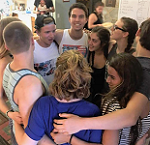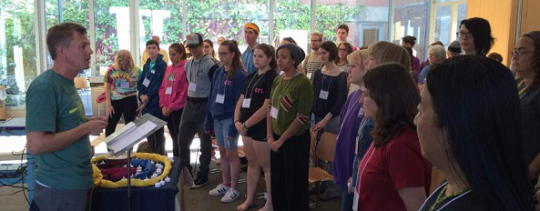| |
 |
| |
At the Youth Ministry Revival, Portland, OR, September 2016. |
Engaging, relevant youth ministry programs help congregations to support younger members in their own searches for truth and meaning, an essential part of their transition to adulthood. The UUA offers many resources to help adults build youth ministries that are inspiring, healthy, and safe. The latest addition is a new series of training webinars sharing best practices with ministers, religious educators, and lay leaders working with youth.
The series of monthly webinars, launched in September 2016, is based on the Competencies for Ministry To/With Youth created by the UUA’s Congregational Life and Youth and Young Adult offices.
For a long time, youth ministry programs and training were developed at the Regional, District, or even the congregational level,” says Kim Sweeney, religious educator and Lead for Faith Formation and Safe Congregations for the New England Region. At a Youth Ministry Roundtable in 2015, participants recognized the need to train leaders in best practices and provide a more consistent message to youth. “The training needed to be free of charge, available across the country, and user-friendly.”
The Congregational Life and Youth and Young Adult offices hosted the first of ten planned webinars in September 2016. Webinars are presented twice to a live audience, and a recording is posted on the web so the training will be available to non-attendees. “Some people attend live, and then use the recordings to train other adults,” noted Kim.
Webinar topics have included healthy relationships between youth and adults, pastoral care to youth, inclusive youth group dynamics, and an overview of competencies for youth ministry. The most recent session addressed communication and social media, and future webinars will focus on building inclusive multigenerational congregations and considering different models of youth ministry.
“I’ve learned so much,” says Jonah Eller-Isaacs, Religious Education Administrator and RE teacher at the First Unitarian Universalist Church of Nashville. The most important thing he learned was that programs and activities are only the beginning. “It shifted my focus for this work to community building and covenant; once you have that, all programs will be effective.”

2016 Youth Ministry Revival. Photos by Eric Bliss.
Webinar topics have included healthy relationships between youth and adults, pastoral care to youth, inclusive youth group dynamics, and an overview of competencies for youth ministry. The most recent session addressed communication and social media, and future webinars will focus on building inclusive multigenerational congregations and considering different models of youth ministry.
As a lifelong UU, the son of two ministers, and a former youth leader, Eller-Isaacs was pleased by the way safety and boundaries have been addressed in the series. “Making sure youth feel safe and are able to express themselves is vital, because the more honest the youth can be, the better I can serve them.”
Both Sweeney and Eller-Isaacs agreed that the value of the webinars goes beyond the content. The ability to connect and share information with their peers has created a growing community of UU adults active in youth ministry around the country. As Jonah points out “No one comes into youth work knowing how to do this naturally. It takes work. It takes learning.”
There are many ways to get involved in youth ministry. Learn more about becoming a Religious Education teacher, youth group advisor, or Our Whole Lives teacher; mentoring youth through life transitions with Coming of Age and Bridging programs; enabling participation in conferences and events; or helping lead youth projects and service trips.
|